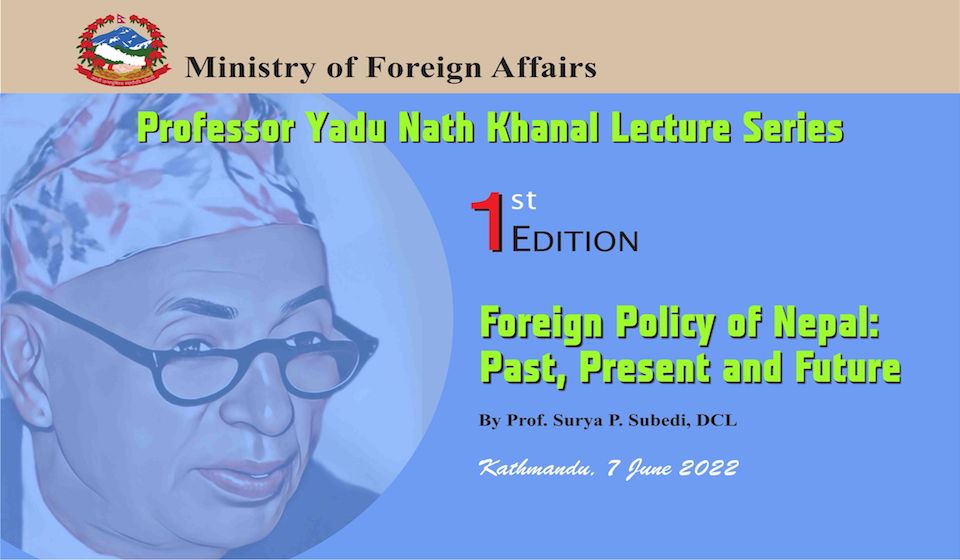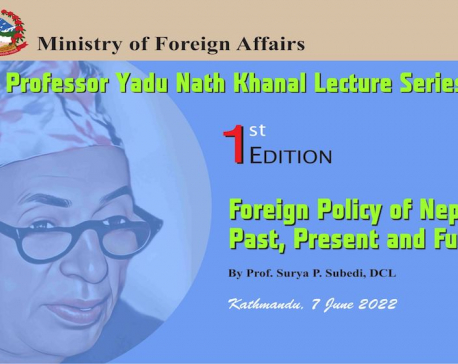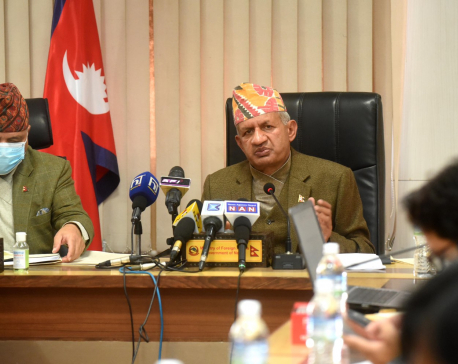
OR
#Opinion
Friendly Response to Scholastic Comments on My Review of Nepal’s Foreign Policy Lecture
Published On: July 3, 2022 06:00 AM NPT By: Madan Kumar Bhattarai


Madan Kumar Bhattarai
Bhattarai is a former foreign secretary. He also served as the foreign affairs advisor to President Bidya Devi Bhandari during her first stint.news@myrepublica.com
After reading the learned comments by a legal expert of eminence on a wide-ranging area of international law, Professor Dr. Surya Prasad Subedi, to our rather cursory and humble observations made on June 21 to his inaugural address for Professor Yadunath Khanal Lecture delivered on June 7, 2022 in the prestigious Myrepublica on June 30, I am in the proverbial fix of what to say or respond to. Just days after the presentation and my layman's response to his stellar address, I was greatly honored to get his very kind and friendly email on June 23, the first such contact after years, in his typically beautiful English in response to my rather casual observations. I thank the prestigious Myrepublica for including my entirely personal observations in their issue.
As I had already spoken my mind in my piece and also shared it in my facebook account, I sought his kind permission with the request that I shall reproduce it in the facebook account of mine to give what can be called a balanced account of my observations and his responses in case he gives green signal. Prof Subedi was very kind to send me an instant email saying that his observations amounted to a friendly response to a friend and this was not meant for public consumption and that I should not include it in any social site including facebook account. I thanked him profusely and said that the matter was closed after his response to my observations.
But since he has rightly chosen to make his comments public in Myrepublica possibly as an afterthought, I have made two decisions. But before elaborating on this aspect, let me, however, reiterate my views that the presentation by an international law expert of Professor Subedi's repute was very good both in the context of institution of inaugural presentation in the name of our Guru in Foreign Service and doyen of Nepal's foreign policy Professor Sardar Yadunath Khanal and the relevance of the topic Professor Subedi was kindly requested to share his enlightened views. In this context, I have been appropriately reminded of the persona of Professor Khanal who though being an academic and professional giant amongst us, never wanted to go beyond his low profile approach of plain living and high thinking normally shying away even from presenting his own views on many issues pertaining to him. On his stellar contributions to the country at large, he was very humble to say that he essentially remained an academic vagabond in terms of educational pursuits and if he had made any contribution of worth, he relished to remain at best a teacher. I salute the great scholar for his down-to-earth simplicity and humbleness and pay tributes to him.
First, I shall stick to our gentleman's agreement of keeping the email part confidential. As I understand from my experience in the government as a "Jagire'' diplomat that what is unsaid is equally sacrosanct as what is said in matters of friendly conversations or interactions as said by top jurist and Ambassador Nani A. Palkhivala, be it for private or public consumption, an area that at least three prominent Wagles of our close friendship, Dr Swarnim Wagle, Dr. Achyut Wagle and Bimal Wagle, and Ambassador Professor Bishwambher Pyakuryal to name only a few, may be able to better decipher. In addition, as Foreign Secretary I was once the recipient of a joint memorandum from a galaxy of American, UN and European heads of missions to pressurize us that Nepal was bound to implement, in both letter and spirit, one so-called gentlemen's agreement, after their similar calls on major political leaders. As an essentially bilateralism in my approach and experience, I saved my skin and turned the tables against their formidably combined firepower by posing several questions simply on account of my sheer ignorance of complex multilateral and legal matters including gentleman's agreement as Professor Tara Nath Sharma during his teaching used to frequently quote the English adage, ignorance is bliss.
Second, I shall make only brief comments on what Prof Subedi has highlighted in his response on June 30 in reply to my comments made on June 21.
1. I did not at all question the merit of the presentation but merely said that it possibly did not do justice to our past and present, with quite an elaborate presentation on the future of Nepal's foreign policy. This is, of course, purely my personal view that I was doctrinated by my teachers from various shades that presentation on any subject should be focused on the topic. Since Professor Subedi has shed enough light on the reason and context for his concentration on future and visionary aspects, I have no reason to dispute his point. Besides, I have no doubt after reading his views that he has a solid base on this aspect and I do share in all sincerity that the presentation and ensuing QA session that I attended in earnest, was very pertinent and useful.
2. On Professor Subedi's taking exceptions to my use of words, fake dreams to be sold, I had made it clear that our political leaders had made such propositions in the past and I personally feel that any such idea was likely to be misconstrued in our context given the apparent failure of these concepts and credibility crisis that our establishment faces. But it does not mean that we can never achieve such goals. I am sorry if my reference to such actions by our people has been misunderstood and being an optimist myself with a tinge of realism of our context despite having been witness to various experiments by successive governments, I really hope and pray that my misconceptions if any on these and other counts are proved totally wrong in future and I would be most happy in the event of such a bright scenario.
3. I frankly admit that I have neither been able to go through all the publications of Professor Subedi nor privy to all of his associations, formal or in confidence, as I have no hesitation to say that I am a bit inbound by nature and constrained by limited exposures that too related to South Asia, Germany and Japan with no postings in any of the P-5 states or international organizations during my days as a diplomat. But I don't have even an iota of doubt that he is a self-made, intelligent and hard working legal luminary with an international name and fame making major contributions in the annals of international law.
4. I have been greatly enlightened by detailed account of his enormous contributions to Nepal including in matters of much talked about MCC imbroglio, as solid evidences of his practical experience of our diplomacy in his very brilliant rebuttal of my rather unplaced feeling that he might not have practical experience of a diplomat. I do admit shortcomings on my part as that happens with many career diplomats as foreign policy and its implementation aspect is rather conservative and quite slow to imbibe changes as stated by Professor Henry A. Kissinger who had to confront State Department machinery many a time. We have a close relative in the foreign service and our definition of close relative goes beyond the purview of immediate or blood relations as we take relationship in a wider perspective, who though spending more than three decades in the service and becoming great expert on international affairs, is not accepted as a member of the foreign service by many as he started not as a foreign service cadre. Similar was the case when Jagannath Dhamija, father of Sumanta and Dinesh with the latter being mostly based in London and known more in Nepal, once told me that he was not accepted as a complete member of the Indian Civil Service despite his diplomatic contributions as Ambassador to Afghanistan and then Czechoslovakia, and Chief of Protocol. It is in this context that I stand corrected and seek profuse apology for my wrong depiction of Professor Subedi as lacking practical diplomatic experience.
5. As a Nepali and close friend, I have everything to be extremely proud of other aspects of diplomatic experience and expertise that Professor Subedi has spoken in terms of his contributions to the United Kingdom and Cambodia as many aspects of which are quite illuminating to me. I do recall references made by my colleagues regarding Professor Subedi's association with Cambodia when I was Foreign Secretary and feeling the heat of the OHCHR especially in the context of my lack of knowledge on multilateralism and international law. Faced with the problems posed by OHCHR and UNMIN that had clearly outlived their utility and started to encroach on issues beyond their mandates or jurisdictions and our successful endeavors to eventually send them back, with dignity and honor, with the best cooperation and coordination of most capable and knowledgeable friends and colleagues despite myself being utterly ignorant of the subject, there is every possibility that I suffer from a rather constrained feeling that international organizations are possibly different in terms of ideal and practice. I have no problem accepting any other explanation if that satisfies me or changes my rather coloured impression on this score. In addition, I have no dispute on 'thin dividing line' linkage between international relations and international law despite my frank admission of being less oriented to international law and more as a constantly learning student of international relations particularly pertaining to Nepal's foreign policy as IR is itself a vast subject.
6. I am particularly impressed by Professor Subedi's reference to King Birendra who during my most limited interactions had taught us that discretion and study were two important aspects for a diplomat that I tend to follow as far as possible. In the context of his reference to our most active and inimitable Foreign Minister Shailendra Kumar Upadhyaya alias Rameshwar Babu, I am proud of longer association and it is tragic that I as Foreign Secretary was in contact with him till his almost last hour as I was regularly monitoring his mountaineering pursuit. Upadhyaya taught us the merits of patience and perseverance in terms of diplomacy. As humble adherents to the ideas and teachings of two of Nepal's greatest persons in recent history, I take it as my bounden duty to pay profound tributes to both.
Last but not least, I seek profound apology if I have unknowingly or in any other way hurt the sentiments of Professor Subedi as this has never been my intention. I stand corrected if I have crossed the lines in presenting my views that are mostly driven by limited academic study in the region and practical experience of two seemingly limited and restrained fields, government journalism and government service. There is absolutely nothing personal in terms of such healthy exchanges of thoughts and ideas.
To conclude, though I am just a dyed in the wool bureaucrat, I have highest respect for intellectuals and academics as I rightly feel that it is their well-thought out and impartial suggestions that provide much needed life, sanctity and moral fabric to the government in its working, and the field of foreign relations in particular sustains drive, initiative and impulse from interactions and feedback from top people in this arena. It is in this aspect that I salute Professor Subedi once again for his wonderfully brilliant exposition and have no doubt that his services to the country at large would constantly be available as he rightly pledged to do so during his most impressive lecture program. I once again thank reputed newspaper, Myrepublica, for finding it convenient to include this piece in their publication once again.
(With two doctorates in international relations, Bhattarai is a former foreign secretary, ambassador, adviser to President on foreign affairs and writer available at kutniti@gmail.com)
You May Like This

A Review of Scholar's Perspective on Nepal's Foreign Policy
In a country where the top guns in politics have frequently made fake promises of making Nepal another Switzerland or... Read More...

Evaluating Nepal’s new foreign policy
To practically implement the new foreign policy, it is important to integrate it with core national interests and priorities. ... Read More...

Nepal Bank Limited's FPO receives frosty response from public
KATHMANDU, July 31: Nepal Bank Ltd (NBL), the government-owned bank, is struggling to sell its shares offered through follow-on public offering... Read More...





Just In
- NRB introduces cautiously flexible measures to address ongoing slowdown in various economic sectors
- Forced Covid-19 cremations: is it too late for redemption?
- NRB to provide collateral-free loans to foreign employment seekers
- NEB to publish Grade 12 results next week
- Body handover begins; Relatives remain dissatisfied with insurance, compensation amount
- NC defers its plan to join Koshi govt
- NRB to review microfinance loan interest rate
- 134 dead in floods and landslides since onset of monsoon this year












Leave A Comment